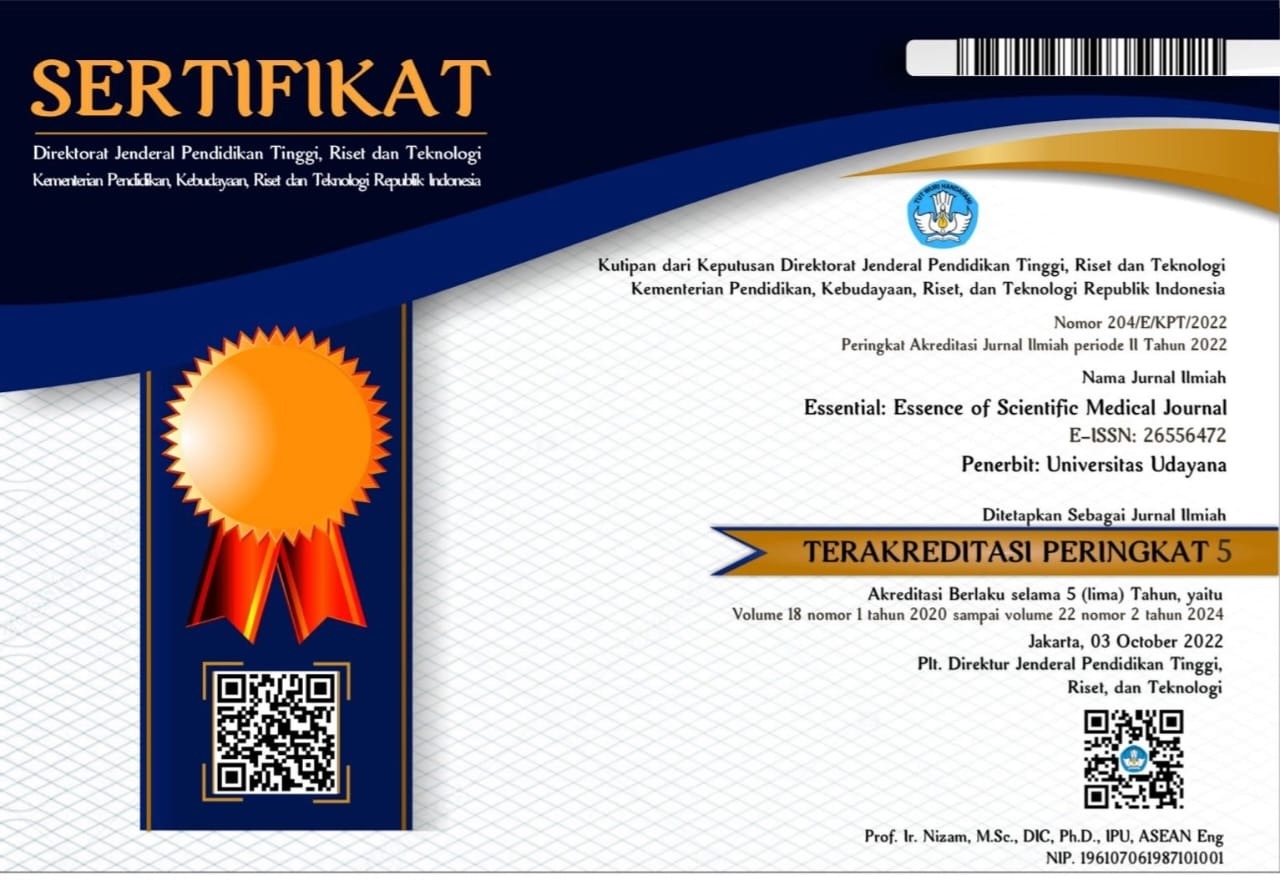KOMPARASI WORKING MEMORY MUSISI DAN NON MUSISI: SEBUAH TINJAUAN PUSTAKA
Abstract
ABSTRAK
Pendahuluan: Working memory merupakan salah satu dari tiga komponen executive function yang mempunyai empat komponen yaitu central executive, phonological loop, visuospatial sketchpad, dan episodic buffer. Banyak penelitian telah mengkaji working memory pada musisi dan non-musisi yang menemukan bahwa performa working memory pada musisi mengungguli non-musisi.
Pembahasan: Working memory mempunyai tiga komponen yang mempunyai peran masing-masing dalam aktivitas yang dilakukan oleh individu. Selain itu, working memory juga sensitif terhadap berbagai faktor, salah satunya adalah pelatihan musik. Pelatihan musik dinilai dapat memengaruhi working memory dan dapat berdampak secara positif terhadap kemampuan working memory. Adanya pengaruh dari pelatihan musik kemudian membuat adanya perbedaan performa dari working memory pada musisi saat dibandingkan dengan non-musisi.
Simpulan: Keunggulan working memory tidak ditemukan secara konsisten pada setiap penelitian yang membandingkan musisi dan non-musisi. Namun secara garis besar, hasil penelitian menunjukkan bahwa musisi mempunyai performa working memory yang lebih unggul dibandingkan non-musisi. Hal ini dapat disebabkan oleh faktor pelatihan musik dan beragamnya keunggulan musisi dapat disebabkan oleh perbedaan pelatihan musik yang dilakukan.
Kata kunci: Working memory, Pelatihan Musik, Musisi, Non-Musisi
Downloads
References
2. Baddeley AD, Logie RH. Working Memory: The Multiple-Component Model. In: Models of Working Memory : Mechanisms of Active Maintenance and Executive Control [Internet]. Cambridge University Press; 1999 [cited 2023 May 5]. p. 28–61. Available from: https://www.cambridge.org/core/books/models-of-working-memory/working-memory-the-multiplecomponent-model/06C301B51DBDFB3D5B4552116CA8B6D7
3. Pozenatto R. Working Memory in Musicians: A Review of Literature. Perspective in Music Education [Internet]. 2021 Mar [cited 2023 Apr 20];21[1]:48–63. Available from: https://www.ingentaconnect.com/content/fmea/rpme/2020/00000021/00000001/art00005#
4. Saarikivi KA, Huotilainen M, Tervaniemi M, Putkinen V. Selectively Enhanced Development of Working Memory in Musically Trained Children and Adolescents. Front Integr Neurosci. 2019 Nov 6;13.
5. Hansen M, Wallentin M, Vuust P. Working memory and musical competence of musicians and non-musicians. Psychol Music. 2013;41[6]:779–93.
6. Nie P, Wang C, Rong G, Du B, Lu J, Li S, et al. Effects of Music Training on the Auditory Working Memory of Chinese-Speaking School-Aged Children: A Longitudinal Intervention Study. Front Psychol. 2022 Jan 26;12.
7. Guo X, Ohsawa C, Suzuki A, Sekiyama K. Improved Digit Span in children after a 6-week intervention of playing a musical instrument: An exploratory randomized controlled trial. Front Psychol. 2018 Jan 8;8[JAN].
8. Baddeley A. Working memory: Theories, models, and controversies. Annu Rev Psychol. 2012;63:1–29.
9. Baddeley A. The episodic buffer: a new component of working memory? Trends Cogn Sci. 2000 Nov 1;4[11]:417–23.
10. Baddeley A. Working Memory: An Overview. Working Memory and Education. 2006 Jan 1;1–31.
11. Baddeley A. Working Memory: The Interfhce between Memory and Cognition. J Cogn Neurosci [Internet]. 1992 [cited 2023 May 12];4[1]:281–8. Available from: https://direct.mit.edu/jocn/article-abstract/4/3/281/3055/Working-Memory-The-Interface-between-Memory-and
12. Baddeley A. The concept of working memory: A view of its current state and probable future development. Cognition. 1981;10[1–3]:17–23.
13. Baddeley AD. Is Working Memory Still Working? American Psychologist. 2001;56[11]:851–64.
14. Santrock JW. Remaja. 11th ed. Hardani W, editor. Penerbit Erlangga; 2007.
15. Luna B, Garver KE, Urban TA, Lazar NA, Sweeney JA. Maturation of Cognitive Processes From Late Childhood to Adulthood. Child Dev [Internet]. 2004 Sep 1 [cited 2023 Jun 13];75[5]:1357–72. Available from: https://onlinelibrary.wiley.com/doi/full/10.1111/j.1467-8624.2004.00745.x
16. Blasiman RN, Was CA. Why is working memory performance unstable? A review of 21 factors. Vol. 14, Europe’s Journal of Psychology. PsychOpen; 2018. p. 188–231.
17. Colom R, Abad FJ, Quiroga MÁ, Shih PC, Flores-Mendoza C. Working memory and intelligence are highly related constructs, but why? Intelligence [Internet]. 2008 Nov 1 [cited 2023 May 24];36[6]:584–606. Available from: https://www.sciencedirect.com/science/article/abs/pii/S0160289608000044
18. Alloway TP. Working memory and executive function profiles of individuals with borderline intellectual functioning. Journal of Intellectual Disability Research [Internet]. 2010 May 1 [cited 2023 May 24];54[5]:448–56. Available from: https://onlinelibrary.wiley.com/doi/full/10.1111/j.1365-2788.2010.01281.x
19. Numminen H, Service E, Ahonen T, Ruoppila I. Working memory and everyday cognition in adults with Down’s syndrome. Journal of Intellectual Disability Research [Internet]. 2001 Apr 1 [cited 2023 May 24];45[2]:157–68. Available from: https://onlinelibrary.wiley.com/doi/full/10.1046/j.1365-2788.2001.00298.x
20. Gathercole SE, Pickering SJ, Ambridge B, Wearing H. The Structure of Working Memory from 4 to 15 Years of Age. Dev Psychol. 2004 Mar;40[2]:177–90.
21. Lambek R, Shevlin M. Working memory and response inhibition in children and adolescents: Age and organization issues. Scand J Psychol [Internet]. 2011 Oct 1 [cited 2023 May 25];52[5]:427–32. Available from: https://onlinelibrary.wiley.com/doi/full/10.1111/j.1467-9450.2011.00899.x
22. Borella E, Carretti B, De Beni R. Working memory and inhibition across the adult life-span. Acta Psychol [Amst] [Internet]. 2008 May 1 [cited 2023 May 25];128[1]:33–44. Available from: https://www.sciencedirect.com/science/article/abs/pii/S0001691807001096?via%3Dihub
23. Borella E, Carretti B, Riboldi F, De Beni R. Working Memory Training in Older Adults: Evidence of Transfer and Maintenance Effects. Psychol Aging. 2010 Dec;25[4]:767–78.
24. Speck O, Ernst T, Braun J, Koch C, Miller E, Chang L. Gender differences in the functional organization of the brain for working memory. Neuroreport [Internet]. 2000 Aug 3 [cited 2023 May 25];11[11]:2581–5. Available from: https://journals.lww.com/neuroreport/Abstract/2000/08030/Gender_differences_in_the_functional_organization.46.aspx
25. Hill AC, Laird AR, Robinson JL. Gender differences in working memory networks: A BrainMap meta-analysis. Biol Psychol. 2014 Oct 1;102:18–29.
26. Arnsten AFT. Catecholamine modulation of prefrontal cortical cognitive function. Trends Cogn Sci [Internet]. 1998 Nov 1 [cited 2023 May 25];2[11]:436–47. Available from: https://pubmed.ncbi.nlm.nih.gov/21227275/
27. Studer-Luethi B, Jaeggi SM, Buschkuehl M, Perrig WJ. Influence of neuroticism and conscientiousness on working memory training outcome. Pers Individ Dif. 2012 Jul 1;53[1]:44–9.
28. Bento-Torres NVO, Bento-Torres J, Tomás AM, Costa VO, Corrêa PGR, Costa CNM, et al. Influence of schooling and age on cognitive performance in healthy older adults. Brazilian Journal of Medical and Biological Research. 2017;50[4].
29. Kosmidis MH, Zafiri M, Politimou N. Literacy Versus Formal Schooling: Influence on Working Memory. Archives of Clinical Neuropsychology [Internet]. 2011 Nov 1 [cited 2023 Aug 23];26[7]:575–82. Available from: https://dx.doi.org/10.1093/arclin/acr063
30. Kensinger EA, Corkin S. Effect of Negative Emotional Content on Working Memory and Long-Term Memory. Emotion. 2003 Dec;3[4]:378–93.
31. Visu-Petra L, Cheie L, Benga O, Packiam Alloway T. Effects of anxiety on memory storage and updating in young children. Int J Behav Dev [Internet]. 2011 Aug 12 [cited 2023 May 30];35[1]:38–47. Available from: https://journals.sagepub.com/doi/abs/10.1177/0165025410368945?journalCode=jbda
32. Elliman NA, Green MW, Rogers PJ, Finch GM. Processing-efficiency theory and the working-memory system: Impairments associated with sub-clinical anxiety. Pers Individ Dif. 1997 Jul 1;23[1]:31–5.
33. Green MW, Rogers PJ. Impaired cognitive functioning during spontaneous dieting. Psychol Med [Internet]. 1995 Sep 9 [cited 2023 May 30];25[5]:1003–10. Available from: https://www.cambridge.org/core/journals/psychological-medicine/article/abs/impaired-cognitive-functioning-during-spontaneous-dieting/047B2389EBB0E325595FC82959C6D153
34. Kemps E, Tiggemann M, Grigg M. Food Cravings Consume Limited Cognitive Resources. J Exp Psychol Appl [Internet]. 2008 Sep [cited 2023 May 30];14[3]:247–54. Available from: https://psycnet.apa.org/record/2008-12802-005
35. Kemps E, Tiggemann M, Wade T, Ben-Tovim D, Breyer R. Selective working memory deficits in anorexia nervosa. European Eating Disorders Review [Internet]. 2006 Mar 1 [cited 2023 May 30];14[2]:97–103. Available from: https://onlinelibrary.wiley.com/doi/full/10.1002/erv.685
36. Greenstein JE, Kassel JD. The Effects of Smoking and Smoking Abstinence on Verbal and Visuospatial Working Memory Capacity. Exp Clin Psychopharmacol [Internet]. 2009 Apr [cited 2023 May 30];17[2]:78–90. Available from: https://psycnet.apa.org/record/2009-04252-006
37. Jacobsen LK, Krystal JH, Mencl WE, Westerveld M, Frost SJ, Pugh KR. Effects of smoking and smoking abstinence on cognition in adolescent tobacco smokers. Biol Psychiatry [Internet]. 2005 Jan 1 [cited 2023 Jun 3];57[1]:56–66. Available from: http://www.biologicalpsychiatryjournal.com/article/S0006322304011023/fulltext
38. Steele CM. A Threat in the Air: How Stereotypes Shape Intellectual Identity and Performance. American Psychologist. 1997;52[6]:613–29.
39. Forbes CE, Schmader T. Retraining Attitudes and Stereotypes to Affect Motivation and Cognitive Capacity Under Stereotype Threat. J Pers Soc Psychol. 2010;99[5]:740–54.
40. Tine M, Gotlieb R. Gender-, race-, and income-based stereotype threat: the effects of multiple stigmatized aspects of identity on math performance and working memory function. Social Psychology of Education 2013 16:3 [Internet]. 2013 May 9 [cited 2023 May 30];16[3]:353–76. Available from: https://link.springer.com/article/10.1007/s11218-013-9224-8
41. Jamieson JP, Harkins SG. Mere Effort and Stereotype Threat Performance Effects. J Pers Soc Psychol [Internet]. 2007 Oct [cited 2023 May 30];93[4]:544–64. Available from: https://psycnet.apa.org/record/2007-13393-004
42. Sellaro R, Hommel B, Manaï M, Colzato LS. Preferred, but not objective temperature predicts working memory depletion. Psychol Res. 2015 Mar 1;79[2]:282–8.
43. Chambers R, Lo BCY, Allen NB. The impact of intensive mindfulness training on attentional control, cognitive style, and affect. Cognit Ther Res. 2008 Jun;32[3]:303–22.
44. Ruocco AC, Direkoglu E. Delineating the contributions of sustained attention and working memory to individual differences in mindfulness. Pers Individ Dif. 2013 Jan;54[2]:226–30.
45. Klingberg T, Forssberg H, Westerberg H. Training of working memory in children with ADHD. J Clin Exp Neuropsychol. 2002;24[6]:781–91.
46. Casement MD, Broussard JL, Mullington JM, Press DZ. The contribution of sleep to improvements in working memory scanning speed: A study of prolonged sleep restriction. Biol Psychol [Internet]. 2006 May 1 [cited 2023 May 31];72[2]:208–12. Available from: https://www.sciencedirect.com/science/article/abs/pii/S0301051105001687
47. Choo WC, Lee WW, Venkatraman V, Sheu FS, Chee MWL. Dissociation of cortical regions modulated by both working memory load and sleep deprivation and by sleep deprivation alone. Neuroimage [Internet]. 2005 Apr 1 [cited 2023 May 31];25[2]:579–87. Available from: https://www.sciencedirect.com/science/article/abs/pii/S1053811904007074
48. Fenn KM, Hambrick DZ. Individual differences in working memory capacity predict sleep-dependent memory consolidation. J Exp Psychol Gen [Internet]. 2012 Aug [cited 2023 May 31];141[3]:404–10. Available from: https://psycnet.apa.org/record/2011-20598-001
49. Kudo M, Lee Swanson H. Are there advantages for additive bilinguals in working memory tasks? Learn Individ Differ [Internet]. 2014 Oct 1 [cited 2023 May 31];35:96–102. Available from: https://www.sciencedirect.com/science/article/abs/pii/S1041608014001575
50. Morales J, Calvo A, Bialystok E. Working memory development in monolingual and bilingual children. J Exp Child Psychol [Internet]. 2013 Feb 1 [cited 2023 May 31];114[2]:187–202. Available from: https://www.sciencedirect.com/science/article/abs/pii/S002209651200166X
51. Baddeley A. Working memory and language: an overview. J Commun Disord [Internet]. 2003 May 1 [cited 2023 May 31];36[3]:189–208. Available from: https://www.sciencedirect.com/science/article/abs/pii/S0021992403000194
52. Bialystok E. Coordination of executive functions in monolingual and bilingual children. J Exp Child Psychol [Internet]. 2011 Nov 1 [cited 2023 May 31];110[3]:461–8. Available from: https://linkinghub.elsevier.com/retrieve/pii/S0022096511001330
53. George EM, Coch D. Music training and working memory: An ERP study. Neuropsychologia. 2011 Apr 1;49[5]:1083–94.
54. Besson M, Schon D, Moreno S, Marques C, Santos A, Santos M, et al. Musical training influences linguistic abilities in 8-year-old children: More evidence for brain plasticity. Cerebral Cortex [Internet]. 2009 Mar [cited 2023 May 31];19[3]:712–23. Available from: https://pubmed.ncbi.nlm.nih.gov/17943015/
55. Lee Y shiow, Lu M ju, Ko H ping. Effects of skill training on working memory capacity. Learn Instr [Internet]. 2007 Jun 1 [cited 2023 May 31];17[3]:336–44. Available from: https://www.sciencedirect.com/science/article/abs/pii/S0959475207000333
56. Yan X, Zhang J, Gong Q, Weng X. Prolonged high-altitude residence impacts verbal working memory: An fMRI study. Exp Brain Res [Internet]. 2011 Feb 25 [cited 2023 May 31];208[3]:437–45. Available from: https://link.springer.com/article/10.1007/s00221-010-2494-x
57. Yan X, Zhang J, Shi J, Gong Q, Weng X. Cerebral and functional adaptation with chronic hypoxia exposure: A multi-modal MRI study. Brain Res [Internet]. 2010 Aug 12 [cited 2023 May 31];1348:21–9. Available from: https://www.sciencedirect.com/science/article/abs/pii/S0006899310013594
58. Dietrich A, Sparling PB. Endurance exercise selectively impairs prefrontal-dependent cognition. Brain Cogn [Internet]. 2004 Aug 1 [cited 2023 May 31];55[3]:516–24. Available from: https://www.sciencedirect.com/science/article/abs/pii/S0278262604001137
59. Lambourne K, Audiffren M, Tomporowski PD. Effects of acute exercise on sensory and executive processing tasks. Med Sci Sports Exerc [Internet]. 2010 Jul 1 [cited 2023 May 31];42[7]:1396–402. Available from: https://europepmc.org/article/med/20019631
60. Hogan CL, Mata J, Carstensen LL. Exercise holds immediate benefits for affect and cognition in younger and older adults. Psychol Aging [Internet]. 2013 [cited 2023 May 31];28[2]:587–94. Available from: https://psycnet.apa.org/record/2013-21685-007
61. Quelhas Martins A, Kavussanu M, Willoughby A, Ring C. Moderate intensity exercise facilitates working memory. Psychol Sport Exerc [Internet]. 2013 May 1 [cited 2023 May 31];14[3]:323–8. Available from: https://www.sciencedirect.com/science/article/abs/pii/S1469029212001380
62. Scholey AB, Harper S, Kennedy DO. Cognitive demand and blood glucose. Physiol Behav. 2001 Jul 1;73[4]:585–92.
63. Sommerfield AJ, Deary IJ, McAulay V, Frier BM. Moderate hypoglycemia impairs multiple memory functions in healthy adults. Neuropsychology [Internet]. 2003 Jan [cited 2023 May 31];17[1]:125–32. Available from: https://psycnet.apa.org/doiLanding?doi=10.1037%2F0894-4105.17.1.125
64. Adan A, Serra G, Josep M. Effects of caffeine and glucose, alone and combined, on cognitive performance. Human Psychopharmacology: Clinical and Experimental [Internet]. 2010 Jun 1 [cited 2023 May 31];25[4]:310–7. Available from: https://onlinelibrary.wiley.com/doi/full/10.1002/hup.1115
65. Giles GE, Mahoney CR, Brunyé TT, Gardony AL, Taylor HA, Kanarek RB. Differential cognitive effects of energy drink ingredients: Caffeine, taurine, and glucose. Pharmacol Biochem Behav [Internet]. 2012 Oct 1 [cited 2023 May 31];102[4]:569–77. Available from: https://www.sciencedirect.com/science/article/abs/pii/S0091305712001980?via%3Dihub
66. Crichton GE, Murphy KJ, Howe PRC, Buckley JD, Bryan J. Dairy consumption and working memory performance in overweight and obese adults. Appetite [Internet]. 2012 Aug 1 [cited 2023 May 31];59[1]:34–40. Available from: https://www.sciencedirect.com/science/article/abs/pii/S0195666312001195?via%3Dihub
67. Luciana M, Collins PF. Dopaminergic Modulation of Working Memory for Spatial but Not Object Cues in Normal Humans. J Cogn Neurosci [Internet]. 1997 May 1 [cited 2023 May 31];9[3]:330–47. Available from: https://direct.mit.edu/jocn/article/9/3/330/3253/Dopaminergic-Modulation-of-Working-Memory-for
68. Scholey A, Ossoukhova A, Owen L, Ibarra A, Pipingas A, He K, et al. Effects of American ginseng [Panax quinquefolius] on neurocognitive function: An acute, randomised, double-blind, placebo-controlled, crossover study. Psychopharmacology [Berl] [Internet]. 2010 Oct 31 [cited 2023 May 31];212[3]:345–56. Available from: https://link.springer.com/article/10.1007/s00213-010-1964-y
69. Nitsche MA, Liebetanz D, Antal A, Lang N, Tergau F, Paulus W. Chapter 27 Modulation of cortical excitability by weak direct current stimulation – technical, safety and functional aspects. Suppl Clin Neurophysiol. 2003 Jan 1;56[C]:255–76.
70. Brunoni AR, Vanderhasselt MA. Working memory improvement with non-invasive brain stimulation of the dorsolateral prefrontal cortex: A systematic review and meta-analysis. Brain Cogn [Internet]. 2014 Apr 1 [cited 2023 May 31];86[1]:1–9. Available from: https://www.sciencedirect.com/science/article/abs/pii/S0278262614000104?via%3Dihub
71. Sudirana IW. Meguru Panggul and Meguru Kuping; The Method of Learning and Teaching Balinese Gamelan. Lekesan: Interdisciplinary Journal of Asia Pacific Arts. 2018 May 22;1[1]:39.
72. Roden I, Grube D, Bongard S, Kreutz G. Does music training enhance working memory performance? Findings from a quasi-experimental longitudinal study. Psychol Music. 2014;42[2]:284–98.
73. Jain C, Devi N, Parthasarathy S, Kavitha S. Effect of musical training on psychophysical abilities and working memory in children. Journal of Indian Speech Language and Hearing Association. 2019;33[2]:71.
74. Gray R, Gow AJ. How is musical activity associated with cognitive ability in later life? https://doi.org/101080/1382558520191660300 [Internet]. 2019 Jul 3 [cited 2023 May 1];27[4]:617–35. Available from: https://www.tandfonline.com/doi/abs/10.1080/13825585.2019.1660300
75. D’Souza AA, Moradzadeh L, Wiseheart M. Musical training, bilingualism, and executive function: working memory and inhibitory control. Cogn Res Princ Implic. 2018 Dec 1;3[1].


 SUBMISSION
SUBMISSION
















